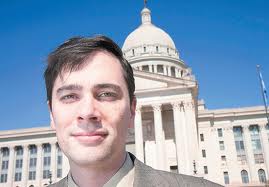Last week I described a key moment from the 2015 legislative session that put the Oklahoma Legislature on a downward transparency trajectory: legislators suspended an important transparency policy because their leaders told them that they would be required to work on a Saturday if they failed to approve the suspension.
This touched off a chain of events that led to the approval of the 2016 fiscal year budget, a budget that is responsible for the $600 million rolling, year-to-year deficit that haunts the state’s fiscal situation to this day.
Since that time the culture of the Legislature has been repeatedly characterized by similar instances.
During the 2016 session, yet another new dangerous trend emerged.
House leaders aggressively sought to advance a large tax increase on tobacco products. The size of this increase created a problem; it placed Oklahoma’s tax rates at a significant disparity to those in surrounding states, and risked creating a black market. This meant the amount of income would be hard to predict and would likely become unstable.
Worse, because the funding would potentially substitute the stable income streams that were currently funding Oklahoma’s health and human services agencies, these agencies were placed in a potentially precarious fiscal situation.
Many legislators were rightly concerned about the impact of this proposal and it became clear that legislative leaders did not have the votes to pass the bill.
So they tried a new technique: the unending, superfluous “show vote”.
The show vote is a strategy designed to incentivize the arm twisting of opposition legislators by special interest groups within a highly pressured environment when policy decisions are made in the emotion of the motion and without deliberative consideration.
Although they knew they didn’t have the votes for passage, House leaders scheduled the new tax for a vote and explained that they intended to keep the vote open for several hours. They believed that those who were opposed to the bill would receive overwhelming pressure from the special interest groups who had mobilized on behalf of the bill.
Under normal circumstances, votes are closed after two minutes of time. This allows legislators enough time to cast their vote but hopefully limits the amount of arm twisting that can occur in the emotion of the moment.
Good policy decisions are never made in the emotion of the moment!
In all my time in the Oklahoma Legislature, this was the first time I can recall House leaders declaring a strategy of not closing a vote with the stated purpose of allowing special interests to lobby legislators for a long period of time during a deliberately open vote.
The voting public should know that when the House holds a vote open for the purpose of special interest lobbying, that means the decisions are made outside of public purview and in a non-transparent environment.
I took note of yet another extremely dangerous, new trend as transparency continued its decline during the 2017 session.
As the session wound down, House leaders took up the habit of keeping the House in session even when the House did not have any business pending. This new practice may have perplexed the casual observer who likely had difficulty figuring out why the House was in session even though no legislators were present on the House floor.
This created a surreal atmosphere in which the legislators could return at any time and start doing business without the constraints of a set time and schedule. In the last days of session, it became routine for the House to stay in session until late at night, even though no activity was taking place on the House floor. The strategy gave rise to the fear that dangerous tax increase legislation could potentially evolve from concept to final passage in a single day’s time.
It was a justifiable concern. Legislators appeared to come under considerable pressure to support leadership on “procedural votes”; the definition of which seemingly included votes to suspend transparency rules.
The perpetual session of the House meant that at any moment the legislators could suddenly materialize on the House floor, take up a motion to suspend transparency, and subsequently pass a tax increase with little public purview.
This new bad habit has been just a part of the new environment in which policy is not made according to open, transparent, thoughtful or deliberative process. Instead, it’s being made behind closed doors and then rushed through the process before legislators can figure out the true implications of what they are doing and before the public can figure out what is being done to them.




Is it just me – does it increasingly appear that the quality, accountability, and honesty of the leaders of both houses decrease by several degrees every day, while the gullibility factor of the followers increase by several degrees, by the same percentages?